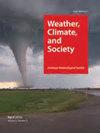极端野火环境及其对太平洋沿岸各州海上导向风的影响
IF 1.9
4区 地球科学
Q3 ENVIRONMENTAL STUDIES
引用次数: 0
摘要
研究人员对1933年至2021年期间对生命和财产构成直接威胁的野火进行了调查,这些野火遍布太平洋沿岸的加利福尼亚州、俄勒冈州和华盛顿州。这些火灾在地方、州和联邦的数据档案和其他来源中被识别出来,产生了150起可供分析的事件。这些火灾的一个子集被分类为与秋季近海导向和夏季非近海导向低层流动状态相关的两种天气尺度模式之一。近海风力驱动的野火附近的邻近分析探测经常显示支持间隙和山波发展的成分,这些成分负责产生快速移动的野火,远距离发现和火焰阵雨,导致生命和财产损失。矛盾的是,强风和低相对湿度的极端组合出现在南加州人口密集的中心地区,而最具破坏性和致命的火灾发生在北加州和俄勒冈州西部人口较少的地区。对40个火灾行为燃料模型数据、荒地-城市界面的住房发展和美国人口普查信息的进一步分析显示,北加州和俄勒冈州西部的野火与更具破坏性的结果有关,因为1)较高比例的社区混合了易燃燃料,2)电源着火发生在社区上游易风的走廊上。3)北加州和俄勒冈州西部的社区由更大比例的社会弱势群体组成,如老年人,他们感知和躲避迅速演变的强烈野火的能力较差。本文章由计算机程序翻译,如有差异,请以英文原文为准。
Extreme Wildfire Environments and Their Impacts Occurring with Offshore-Directed Winds across the Pacific Coast States
Wildfires that posed an immediate threat to life and property during the period 1933–2021 were examined across the Pacific Coast states of California, Oregon, and Washington. Such fires were identified in local, state, and federal data archives and other sources which yielded 150 events for analysis. A subset of those fires were sorted into one of two synoptic-scale patterns associated with a fall season offshore-directed and summer season non-offshore-directed low-level flow regime. Proximity analysis soundings near the offshore wind-driven wildfires frequently displayed ingredients that supported gap and mountain wave development, which were responsible for generating fast moving wildfires, long-distance spotting, and firebrand showers that resulted in loss of life and property. Paradoxically, the most extreme combinations of strong winds and low relative humidity were observed near high population centers in Southern California, yet the most destructive and deadly fires were in less populated regions of Northern California and Western Oregon. Additional analysis of 40 Fire Behavior Fuel Models data, housing development in the wildland-urban interface, and U.S. census demographic information revealed that the Northern California and Western Oregon wildfires were associated with more devastating outcomes because 1) a higher ratio of communities were intermixed with flammable fuels, 2) fire ignitions of an electrical origin occurred in wind prone corridors that were upstream from communities, and 3) communities in Northern California and Western Oregon were composed of a greater percentage of socially vulnerable people such as the elderly who were less capable of perceiving and evading intense rapidly evolving wildfires.
求助全文
通过发布文献求助,成功后即可免费获取论文全文。
去求助
来源期刊

Weather Climate and Society
METEOROLOGY & ATMOSPHERIC SCIENCES-
CiteScore
3.40
自引率
13.60%
发文量
95
审稿时长
>12 weeks
期刊介绍:
Weather, Climate, and Society (WCAS) publishes research that encompasses economics, policy analysis, political science, history, and institutional, social, and behavioral scholarship relating to weather and climate, including climate change. Contributions must include original social science research, evidence-based analysis, and relevance to the interactions of weather and climate with society.
 求助内容:
求助内容: 应助结果提醒方式:
应助结果提醒方式:


